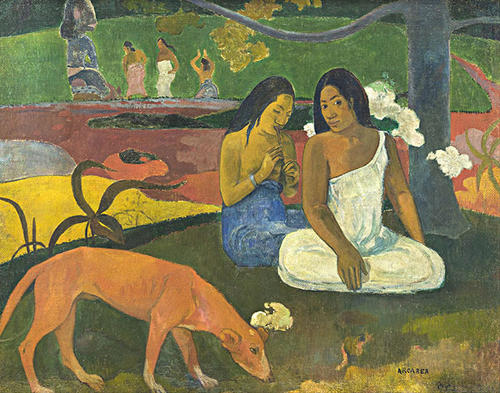People from Asia and Africa were displayed to the public in mock villages...
亞洲與非洲人在仿制村莊中公開(kāi)展覽
Along with their art...
一同展出的還有他們的藝術(shù)品
And their architecture.
和他們的建筑
In the heart of the capital,the cultures of colonial peoples were here being contrasted with the assumed superiority of France.
在首都中心殖民地人民的文化與法國(guó)自恃的優(yōu)越性形成了鮮明對(duì)比
In the view of the time, it was the sophistication of French civilisation,
在當(dāng)時(shí)看來(lái) 法蘭西文明的復(fù)雜與成熟
with its links back through the Enlightenment,the Renaissance and to the classical world,
以及其與啟蒙運(yùn)動(dòng) 文藝復(fù)興和古典世界的聯(lián)系
that gave France the right to rule over the supposedly primitive peoples of her empire.
使法國(guó)自認(rèn)為有權(quán) 統(tǒng)治帝國(guó)境內(nèi)所謂的原始人民
And so the organisers of the Exposition Universelle imagined that visitors who came here would revel at the sight of members of these supposedly lower races on display,
因此在世界博覽會(huì)組織者的想象中來(lái)到這里的參觀者 將會(huì)因?yàn)榭吹竭@些被展出的所謂低級(jí)種族 而狂歡陶醉
and that they'd do so confident in the belief that they were being guided by France and her civilising mission.
并且他們滿懷信心地相信 他們是在遵循法蘭西及其文明開(kāi)化使命的指引
What visitors were not supposed to do was to see in the art and the culture of Africa and Asia the potential for an escape from Europe and from Western civilisation.
組織者不希望參觀者從非洲與亞洲的藝術(shù)和文化中看到的 是逃離歐洲 逃離西方文明的可能性
And yet that is exactly the view taken by an artist who was one of the 28 million people who passed under the Eiffel Tower and entered the exposition in the summer of 1889.
而這卻正是1889年夏天穿過(guò)埃菲爾鐵塔進(jìn)入博覽會(huì)的 兩千八百萬(wàn)參觀者中的一名藝術(shù)家 所獲得的領(lǐng)悟

His name was Paul Gauguin,a former city trader who had lost it all in the financial crash of 1882.
他的名字是保羅·高更 曾是一名在1882年經(jīng)濟(jì)危機(jī)中 傾家蕩產(chǎn)的證券交易員
He'd grown to hate the stifling conventions of bourgeois society.
他早已痛恨資產(chǎn)階段社會(huì)中 令人窒息的條規(guī)
He wanted to leave it all behind and find somewhere not yet tainted by the artificiality of modern life.
他想將一切置之腦后尋找一個(gè)尚未被現(xiàn)代生活中的人造元素所影響的純凈世界
The restless Gauguin had already sought escape in the quiet backwaters of France and Martinique.
在法國(guó)和馬提尼克平靜的死水里 不安歇的高更都曾尋求逃離
But each time he had returned to Paris.
但每次他都會(huì)回到巴黎
Now, after visiting the exposition and seeing its colonial villages,
然而在參觀了博覽會(huì)并見(jiàn)到它展示的殖民地村莊之后
Gauguin decided that in order to find paradise, he should head for the South Pacific,for the island of Tahiti.
高更決定 為了尋找天堂 他要前往南太平洋前往塔希提島
As Gauguin left, he wrote to a friend,
高更離開(kāi)時(shí)在給朋友的信中寫(xiě)道
"The European Gauguin has ceased to exist."
"歐洲的高更已經(jīng)不復(fù)存在了"
To him, Tahiti represented an almost mythical Eden.
于他而言 塔希提代表著近乎神話般的伊甸園











